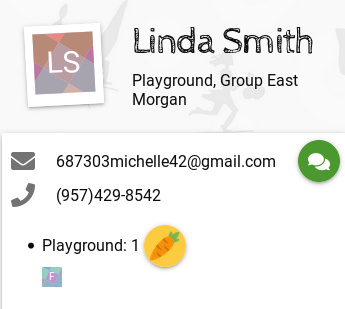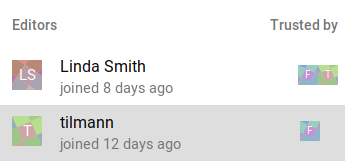Karrot currently does not have user roles. Every group member is equal, there are no special powers. This follows an idealistic view and simplifies implementation, but there are problems coming with it. Especially new users might change group settings in unwanted ways, so groups might hold back from accepting new people into the group.
Here’s a new proposal!
As part of this Github issue, some concrete ideas emerged. Our current proposal is to introduce two user roles: newcomers and editors.
When joining a group, users start as newcomers. They can write messages, join pickups and give feedback, but not edit group settings, modify stores or modify pickups. Newcomers will be marked in a special way when they join pickups, so that it’s easy for other users to recognize and help them.
After they have gained experience, newcomers are supposed to become editor. The time frame depends entirely upon other group members. It can be after one week, but can also be on the same day they joined - or never. Group members need to explicitly express their trust in the newcomer. Once a certain threshold is reached, Karrot upgrades the user to be an editor.
An editor can do exactly the same things as current group members in Karrot. In fact, every existing group member will be made into editor once the new feature gets rolled out. This should make the transition as smooth as possible.
…but some questions are still open…

Should people give trust on the user profile?
Before the feature can get implemented, we need to solve a few tricky questions. How can we make sure that most users become editors eventually? We strongly think that closed editor elites are detrimental for the success of foodsaving groups, so we want to make sure that the user roles are not being used for this purpose. Our current idea is to count trust not only from editors but from newcomers as well, as a way to “break” blockades.
Where’s the incentive for giving trust to fellow users? It should be seen as core part of being an active member of the group, similar as doing pickups and giving pickup feedback. We thought about hooking the trust into the pickup feedback. That means: if you did a pickup with someone you didn’t give trust yet, Karrot will ask you to give trust to the other person while giving feedback for the pickup.
Another hot topic was the question if newcomers should be able to join pickups at all. Two reasons speak against newcomers doing pickups: 1) possibly disturbing the cooperation when doing the first pickup alone and 2) lowered incentive to become editor. On the other hand, the newcomer role seems rather useless if one can only write messages, it does not seem different from being in the state of a group applicant. Also, if newcomers have the pickup information, they might just show up at the store, even without joining the pickup. That’s why the current proposal allows joining pickups, but adds some kind of badge to newcomers, so that experienced members can join them.
We’re aware that some members are happy with only doing pickups and don’t want to have the increased responsibility of editing the group. We’re not sure yet if we want to give users the possibility to abstain from becoming editor, but in any case it would be useful to inform them about the fact that they just became editor, and what additional powers it brings.

Should we show trust on the group members list?
Your feedback please!
Ok, that’s it! What do you think of it? It’s the first bigger change to the group membership structure in Karrot, so we’re a bit nervous with it and would like to make sure that we implement something that benefits all existing and future foodsaving groups that use Karrot!
This proposal was worked out by me, discussed with @taistadam, @djahnie and @nicksellen. It is based on the “student mode” idea from Solikyl Gothenburg, on the trust system idea from Chandi and countless related discussions.


